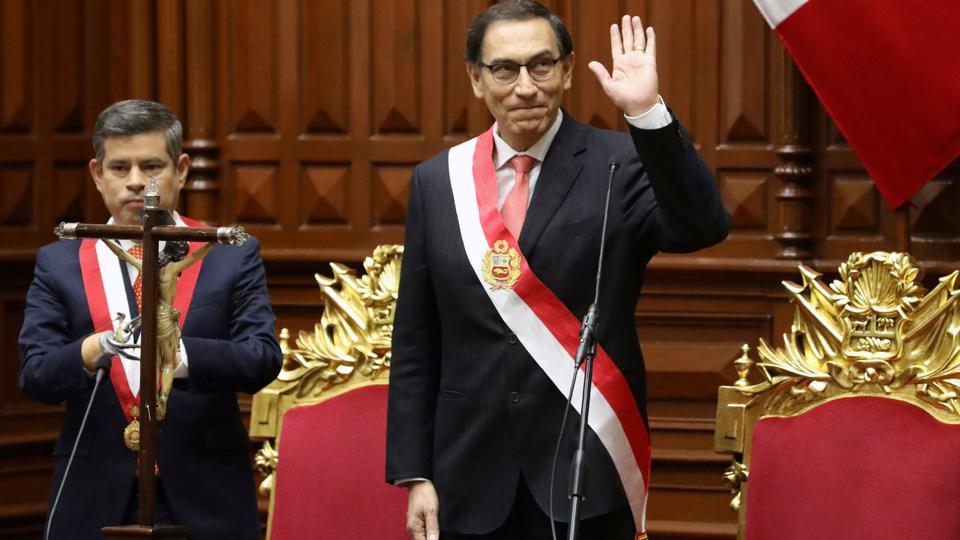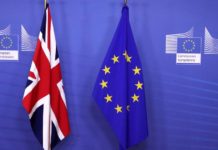Martin Vizcarra sworn in as Peru’s new president
Vizcarra promised to fight Peru’s corruption after his predecessor Pedro Pablo Kuczynski resigned to avoid an impeachment vote over corruption allegations.
 Vice President Martin Vizcarra gestures, as he is sworn in as Peru’s President, at the congress building in Lima, Peru on March 23, 2018 (Reuters)
Vice President Martin Vizcarra gestures, as he is sworn in as Peru’s President, at the congress building in Lima, Peru on March 23, 2018 (Reuters)
Martin Vizcarra was sworn in as Peru’s new president on Friday, catapulted to the post when Pedro Pablo Kuczynski resigned to avoid impeachment.
In his first address as president, Vizcarra, who was both vice president as well as his country’s ambassador to Canada appealed for national unity and urged young Peruvians not to succumb to cynicism.
“Don’t lose faith in our institutions,” Vizcarra said in remarks to congress shortly after being draped in the red and white presidential sash. “Let us show you that Peru is bigger than its problems.”
Vizcarra’s 15-minute speech was short on specifics. Other than vowing to form a completely new Cabinet, he gave little insight into how he would attack endemic corruption.
But he received warm applause from lawmakers weary of the months-long effort to oust Kuczynski, whose resignation from the presidency was approved overwhelmingly just a few hours earlier.
“We will stand firm in the fight against corruption. Transparency will be a pillar of our administration,” Vizcarra said, adding that, “better times will come.”
Scandal-tainted president
Kuczynski, 79, had a strikingly short tenure as president: the former Wall Street banker was elected by a razor-thin margin in June 2016, and took office the following month.
But he lacked a majority in Congress, and was almost immediately embroiled in a messy conflict with the main opposition party, Popular Force, led by Keiko Fujimori, the daughter of disgraced ex-president Alberto Fujimori.
When reports emerged linking Kuczynski to Brazil’s scandal-plagued construction giant Odebrecht — accused of paying massive bribes to politicians around Latin America for juicy public works contracts — Popular Force mounted a relentless push to remove the president from office.
Odebrecht revealed in December that it had paid nearly $5 million to consulting companies linked to Kuczynski when he was finance minister.
The former president survived a first impeachment vote that month. Three days later, he granted a pardon on medical grounds to former president Fujimori, who had been in jail for corruption and human rights violations.
That sparked speculation of a back-room deal with an opposition faction led by Keiko Fujimori’s brother and sometime rival Kenji Fujimori.
When video tapes emerged of Kenji, who has now split from his sister’s party, apparently offering bribes to a fellow lawmaker to vote against the December impeachment, the political damage to Kuczynski proved to be too much.
Facing a new impeachment vote, he announced his resignation on Wednesday, proclaiming his innocence but saying it was for the good of the country.
Fujimori truce?
Vizcarra inherits a country still reeling from the drama and deeply mistrustful of its politicians, just as its strong economy is slowing.
Like Kuczynski, he will face an opposition-controlled Congress, though he may benefit from the fact that he has no connection to traditional political parties.
Keiko Fujimori appears willing to declare a truce — at least for now.
“This is a moment to stand united as Peruvians, strong and optimistic in the face of the challenges that await us,” she wrote on Twitter.
Impeach or resign?
Earlier Friday, Kuczynski had threatened to withdraw his resignation, saying on Twitter he would rather be impeached and have a trial at which he would have a chance to defend himself.
Ironically, the situation echoed what happened to Alberto Fujimori himself in 2000, at the end of his decade-long run as Peru’s president.
Fujimori had resigned the presidency by fax — sent from exile in a hotel room in Japan — but Congress rejected the resignation, choosing instead to punish the ex-strongman.
Lawmakers ultimately impeached Fujimori on the grounds of “permanent moral incapacity,” ending weeks of political drama.
By resigning on the eve of the new impeachment vote, Kuczynski was hoping to avoid the same fate.
 Vice President Martin Vizcarra gestures, as he is sworn in as Peru’s President, at the congress building in Lima, Peru on March 23, 2018 (Reuters)
Vice President Martin Vizcarra gestures, as he is sworn in as Peru’s President, at the congress building in Lima, Peru on March 23, 2018 (Reuters)









